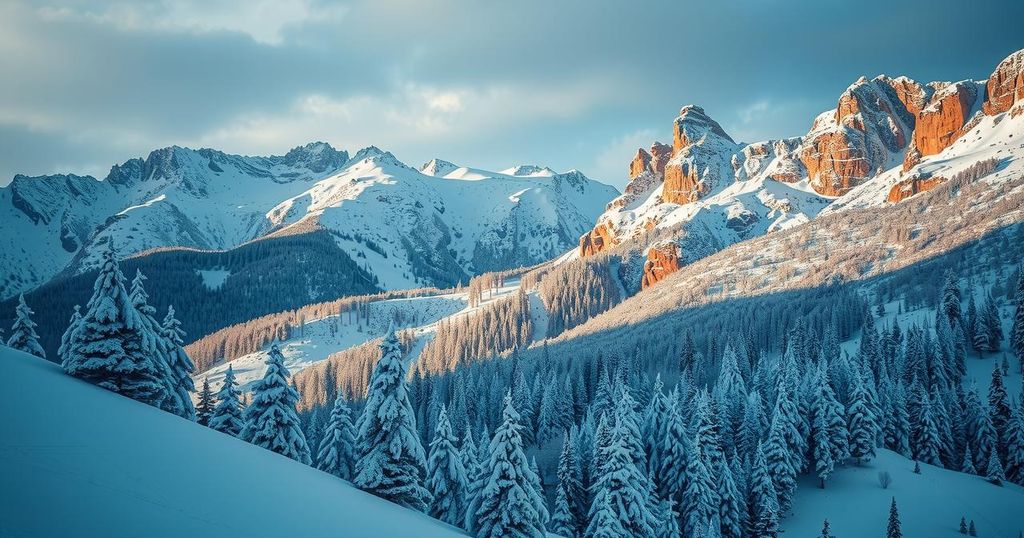Snowfall in Africa: Seven Nations with Winter Wonders

Despite Africa’s reputation for warmth, several nations experience snowfall due to their high-altitude geographical features. These seven countries —South Africa, Morocco, Lesotho, Tanzania, Uganda, Algeria, and Ethiopia—present unique landscapes during winter months that emphasize the continent’s climatic diversity. Each region offers a distinct experience for visitors, encouraging exploration of these unexpected snowy environments.
Snowfall in Africa often surprises many due to the continent’s predominantly warm climate. Yet, there are several regions in Africa that experience snow, primarily attributed to their elevation and geographical features. In these specific locales, the winter months transform the landscape, unveiling a snow-covered terrain that challenges common perceptions of Africa’s climate. Understanding this phenomenon highlights the diverse climates and environments present across the continent, inviting exploration and adventure. The following seven African nations experience snowfall: 1. South Africa: Despite being known for its warm temperate climate, specific regions in South Africa such as Gauteng, parts of Johannesburg, the Drakensberg Mountains, and certain areas of the Western Cape witness snowfall during winter, transforming them into picturesque icy landscapes. 2. Morocco: Renowned for its diverse topography, Morocco features areas such as the Atlas Mountains, where consistent snowfall occurs. The town of Ifrane is particularly notable, often likened to Switzerland for its charming winter scenery and architecture. 3. Lesotho: As a landlocked country entirely situated above 1,000 meters in elevation, Lesotho experiences regular snowfall during the winter months of June to August. This unique geographic feature allows for captivating winter scenes that attract both residents and visitors. 4. Tanzania: The highest peak in Africa, Mt. Kilimanjaro, is the principal site for snowfall in Tanzania. The mountain’s summit can experience arctic conditions, particularly during the dry season, with the most significant snowfall occurring in December. 5. Uganda: Snowfall occurs chiefly on the peaks of the Rwenzori Mountains, creating a striking contrast with the lower landscapes. Adventurous travelers often hike to witness this rare occurrence. 6. Algeria: Though primarily characterized by an arid climate, Algeria experiences rare snowfall in specific northern areas, particularly in the Tell Atlas which includes the Kabylie and Aurès Mountains. 7. Ethiopia: The country’s varied topography allows for occasional snowfall, notably in the Simien Mountains, which are UNESCO World Heritage Sites. These elevations are attractive for hikers eager to experience these unique climatic conditions. Overall, these instances of snowfall in Africa underscore the continent’s climatic diversity and invite an appreciation for its natural beauty and geographical complexities.
The phenomenon of snowfall in Africa is intriguing, given the continent’s general association with warmth and aridity. However, certain high-altitude regions defy this stereotype, revealing a fascinating aspect of Africa’s geography. Snowfall in these areas occurs primarily during the winter months, emphasizing the continent’s climatic diversity that can vary dramatically within relatively short distances. This diverse weather pattern not only presents unique natural environments but also offers opportunities for adventure tourism, enhancing the appeal of these regions.
In conclusion, snowfall in Africa, though uncommon, exists in several nations, showcasing the continent’s varied climatic conditions. From the icy peaks of Mt. Kilimanjaro to the snow-draped landscapes of the Drakensberg Mountains, these regions attract curiosity and exploration. Understanding the locations where snow occurs helps to challenge preconceived notions about Africa’s climate, revealing a rich tapestry of natural environments across the continent. Such knowledge not only surprises but also encourages a deeper appreciation for Africa’s geographical diversity.
Original Source: businessday.ng






